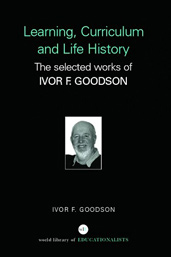Learning, Curriculum and Life Politics: the selected works of Ivor F. Goodson
Towards a Social Constructionist Perspective
Of course the dilemma facing men of knowledge, which Mills describes is of acute importance when that knowledge relates to schooling. For in the schools knowledge is transmitted to future generations - hence if our knowledge of such knowledge transmission is flawed we are doubly imperiled. But schooling is so intimately related to the social order that if our knowledge of schooling is inadequate or has no public relevance then major aspects of social and political life are obscured.
Hence the question of 'whither educational or curriculum research' is one of great importance. Mills, I think, come close to the nature of our dilemma and spells out the implications of the Devil's Bargain when he talks of the way 'men of knowledge' orient themselves to 'special segments of society'. This has been the fate of much educational and curriculum theory and the effect has been that as Mills put it different groups 'talk past each other'. With few exceptions I would argue this is precisely the relationship between curriculum scholars and school practitioners: they comprise a model exercise in how to 'talk past each other'. It is to the resolution of this problem that I now turn. Again partly in the spirit of Mills who once said in a letter to a 'white collar wife' in a weekly mass publication journal: “It is one thing to talk about general problems on a national level and quite another to tell an individual what to do. Most 'experts' dodge that question. I do not want to” (Wright Mills 1970).
Recent Reactions to CAP
As a result of the perceived moribund nature of curriculum scholarship and its peculiarly displaced location in University Schools of Education in the 1960s and 1970s the distinction between theory and practice often led to a reaction against theory per se not to a reformulation of theory. Theory as it had been constituted merely collided with curriculum reality. The collision left the theorists fairly overtly at a loss - 'we'd better leave this to others'. But the 'others' who were more immersed in the reality of curriculum production and operation drew their own conclusions about theory. If it had so little to say about the reality of practice, if in fact it grievously misrepresented or even 'threatened to replace' practice was it not best to do without theory altogether or at least leave theorizing until later?
The response in the curriculum field strongly echoes the pendulum swings in sociology at about the same time. The preeminent positivist enterprise employed a scientific hypothetical-deductive model. The aim was to discover the social laws that underpinned everyday reality. Above all they followed a model related to the philosophy of science, which had as its major objective the seeking of objective facts about the social world. The scientist seeks a knowledge of the social system separate and beyond the perceptions of the people who inhabit that system, pursuing wide-ranging laws and truth.
